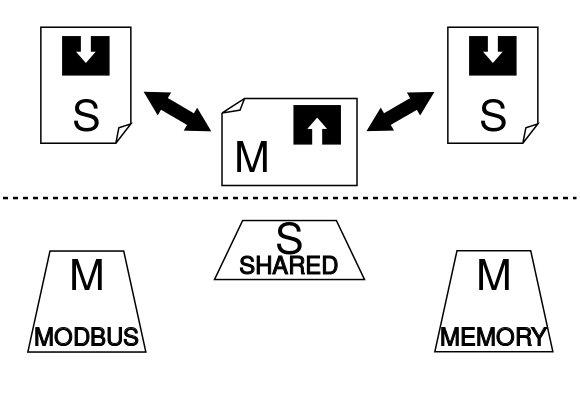Modbus Shared Memory - Simpler is Better.¶

Introduction¶
Tired of all those excelent, fully featured Modbus libraries? Just want to establish this annoying communication and start doing important stuff? Here you have it.
- Modbus Shared Memory is a library that allows you to:
- establish Modbus communication,
- forget about Modbus communication.
- Modbus Shared Memory implements well-known concept from field of PLC programming. A programmer:
- declares memory block - variables which will be exchanged via Modbus,
- declares an object responsive for modbus communication,
- does something with those variables - rest of the program.
from ModbusSharedMemory.client_server import ModbusMasterTCP
from ModbusSharedMemory.memory import MemoryStore, MemoryVariable
# declare 8 Word = 16 Bytes long memory
mem = MemoryStore(8)
# map some variables to memory addresses, name them as you wish
mem.STATE = MemoryVariable.word(address=0) # 2 Bytes
mem.COUNTER = MemoryVariable.uint32(address=1) # 4 Bytes
# declare master worker, will exchange memory
client = ModbusMasterTCP(mem, server_ip='localhost', default_slave_id=1)
# start exchanging
client.run()
# now play with variables - do your stuff
mem.COUNTER = 10
print(mem.STATE)
# ...
# at the end, kill client worker
client.kill()
Motivation and features¶
Modbus Shared Memory is a python module, written in pure python, that implements concepts known from PLC programming manner. It greatly simplifies task of using Modbus protocol as a data exchange system. The whole idea born around a concept of using cheap micro-computers (eg. raspbery pi, asus tinkerboard etc.) as a HMI device, communicating with a PLC via modbus protocol. It is widely-used pattern to incorporate Modbus as a data exchange layer between PLC and HMI. Searching for a Modbus protocol implementation for python lead us to two options: uModbus and PyModbus. Those two libraries implements Modbus protocol and expose Modbus functions for programmer use. Those are great libraries, but we noticed one disadvantage: since those two are excelent for low-level manipulation and they gives much flexibility, they lacks a really simple interface known from PLC universe: declare memory that will be exchanged and forget about modbus. Modbus Shared Memory is our attempt to recreate that interface.
Features¶
- We can enumerate current features:
- MSM depends on standard python modules and a uModbus, which is writen in pure python,
- MSM is written in pure python too, it does not require any compilation steps during installation,
- can be used in any enviorment that supports python
- it is small and simple
- it does the job
- it supports abstraction layer for both: slave (PLC side) and master (HMI side)
Limitations¶
- MSM is great, however it is still under development. Current limitations are:
- MSM supports only ModbusTCP. ModbusRTU is under development
- MSM server (slave) is using only memory-based Modbus functions: no. 3, 6 and 16. Rest of standard functions are under development too.
- Modbus client (master) implements only memory register based mode. Coils and Inputs are under development.